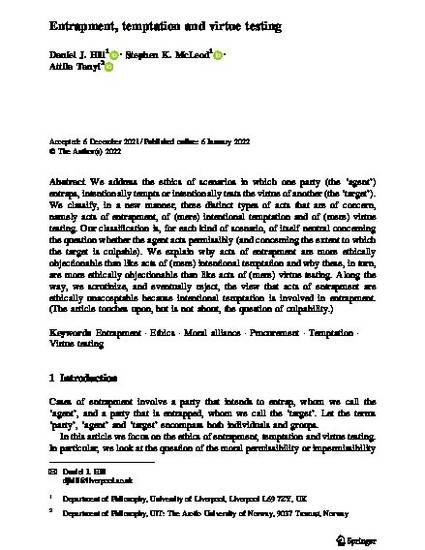
Article
Entrapment, Temptation, and Virtue Testing
Philosophical Studies
(2022)
Abstract
We address the ethics of scenarios in which one party (the ‘agent’) entraps, intentionally tempts, or intentionally tests the virtue of another (the ‘target’). We classify, in a new manner, three distinct types of acts that are of concern, namely acts of entrapment, of (mere) intentional temptation and of (mere) virtue testing. Our classification is, for each kind of scenario, of itself neutral concerning the question whether the agent acts permissibly (and concerning the extent to which the target is culpable). We explain why acts of entrapment are more ethically objectionable than like acts of (mere) intentional temptation and why these, in turn, are more ethically objectionable than like acts of (mere) virtue testing. Along the way, we scrutinize, and eventually reject, the view that acts of entrapment are ethically unacceptable because intentional temptation is involved in entrapment. (The article touches upon, but is not about, the question of culpability.)
Keywords
- entrapment,
- ethics,
- moral alliance,
- procurement,
- temptation,
- virtue testing
Disciplines
Publication Date
2022
DOI
https://doi.org/10.1007/s11098-021-01772-4
Citation Information
Attila Tanyi, Stephen McLeod and Daniel J Hill. "Entrapment, Temptation, and Virtue Testing" Philosophical Studies Vol. 147 Iss. 8 (2022) p. 2429 - 2447 Available at: http://works.bepress.com/attila_tanyi/41/
